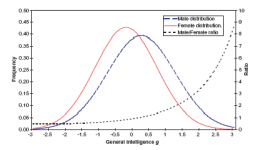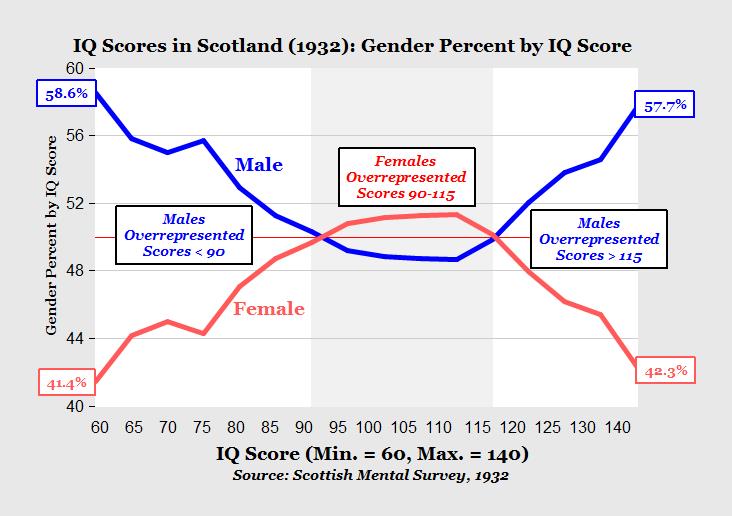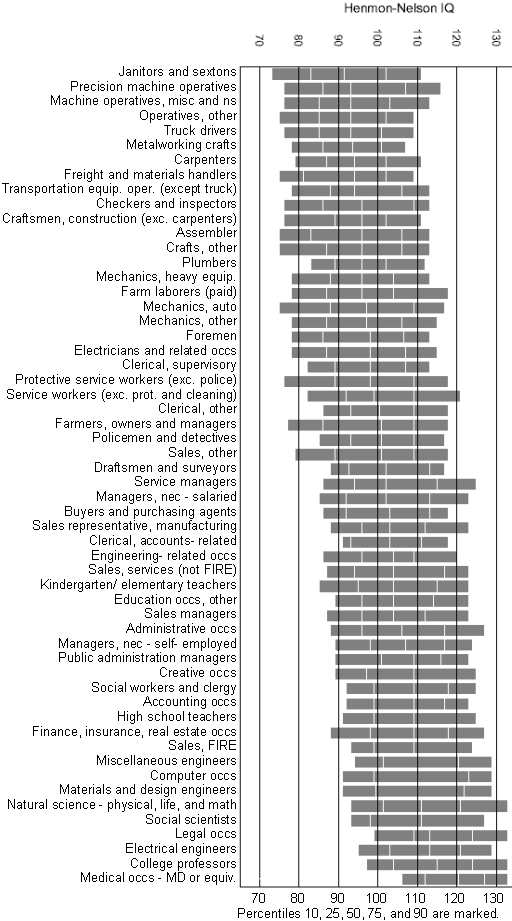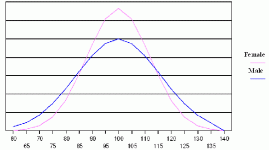-
Features
-
Friends of IIDBFriends Recovering from Religion United Coalition of Reason Infidel Guy
Forums Council of Ex-Muslims Rational Skepticism
Social Networks Internet Infidels Facebook Page IIDB Facebook Group
IIDB Archives FRDB Archive Secular Café Archive
You are using an out of date browser. It may not display this or other websites correctly.
You should upgrade or use an alternative browser.
You should upgrade or use an alternative browser.
Population of Male/Female by IQ
- Thread starter George S
- Start date
George S
Veteran Member
There are more women than men in the 85-115 range.
There are more brilliant men than women.
There are more stupid men than women.
There are more brilliant men than women.
There are more stupid men than women.
George S
Veteran Member
Can you provide a source for the graph, please?
That particular image was found at http://blogs.warwick.ac.uk/hsirhan/entry/misogynists_of_the/
Search "Images male female IQ"
Here's another: http://3.bp.blogspot.com/_4ify7vDXr.../VhFJbXouRP0/s640/male_female_bell_curve_.png

Can you provide a source for the graph, please?
That particular image was found at http://blogs.warwick.ac.uk/hsirhan/entry/misogynists_of_the/
The commenter that provided that image did not provide a source.
This is the received wisdom. But the Independent journo is too poor at statistics to understand the implications of this.
Let’s go along with received wisdom and suppose both males and females have the same mean I.Q., but the I.Q.’s of the males have a larger variance. Then if a sample is taken which is biased towards higher I.Q., the mean of that sample will be higher for males than females. But the mean of a sample biased towards lower I.Q., will have a higher mean I.Q. for the females than for the males.

University students have, I understand, a higher I.Q. than the population as a whole. they should also be able to read sources critically.
In fact, it appears that the commenter just made up the graph to illustrate a presupposition; it's not even based on a dataset.
Search "Images male female IQ"
Here's another: http://3.bp.blogspot.com/_4ify7vDXr.../VhFJbXouRP0/s640/male_female_bell_curve_.png
View attachment 8069
That link points directly to the image, not it's source, which appears to be another blog.
George S
Veteran Member
In the Wiki of Sex Differences in Intelligence we find:
Variability[edit]
Some studies have identified the degree of IQ variance as a difference between males and females. Males tend to show greater variability on many traits, for example having both highest and lowest scores on tests of cognitive abilities,[18][62][63] though this may differ between countries.[64][65][66]
Feingold (1992b) and Hedges and Nowell (1995) have reported that, despite average sex differences being small and relatively stable over time, test score variances of males were generally larger than those of females.[67] Feingold found that males were more variable than females on tests of quantitative reasoning, spatial visualisation, spelling, and general knowledge. […] Hedges and Nowell go one step further and demonstrate that, with the exception of performance on tests of reading comprehension, perceptual speed, and associative memory, more males than females were observed among high-scoring individuals.[67]
Some recent studies also suggest, that greater male variability has decreased in time[68] and disappears at countries with more gender equal cultures.[69][70]
_____
18 Wai, Jonathan; Cacchio, Megan; Putallaz, Martha; Makel, Matthew C. (2010). "Sex differences in the right tail of cognitive abilities: A 30year examination". Intelligence. 38 (4): 412–423. doi:10.1016/j.intell.2010.04.006. ISSN 0160-2896.
62 Lehrke, R. (1997). Sex linkage of intelligence: The X-Factor. NY: Praeger.[page needed]
63 Lubinski, D.; Benbow, C. P. (2006). "Study of Mathematically Precocious Youth After 35 Years: Uncovering Antecedents for the Development of Math-Science Expertise". Perspectives on Psychological Science. 1 (4): 316–45.
Last edited by a moderator:
I think that it's not so much that there is an appreciable male-female IQ difference, but that there is an appreciable male-female divergence in interests. That boys prefer boy toys and girls prefer girl toys is just one of those things. It's not about intelligence.
http://www.sciencedirect.com/science/article/pii/S0160289616301003
Sex differences in intelligence: A multi-measure approach using nationally representative samples from Romania
http://www.sciencedirect.com/science/article/pii/S0160289616301003
Shadowy Man
Contributor
In the Wiki of Sex Differences in Intelligence we find:
Variability[edit]
[…] Hedges and Nowell go one step further and demonstrate that, with the exception of performance on tests of reading comprehension, perceptual speed, and associative memory, more males than females were observed among high-scoring individuals.[67]
Which means that for reading comprehension, perceptual speed, and associative memory females are either equal or greater than males in number.
It's never been clear to me what exactly IQ measures. Or what kinds of intrinsic biases in the tests there may be. It seems that these sources are breaking things down into subcategories, but not giving them scores. IQ is represented by a single number and I find it very unlikely that this single number is useful as a predictor of any individual person's cognitive abilities, as complex and varied as they are. If they are testing various cognitive abilities, they should report scores of these variety of tests.
George S
Veteran Member
What exactly is the point of IQ, other than rationing social resources and giving ammunition to groups claiming 'superiority' to others?
Originally it was designed by a Frenchman to save money in the public schools. It was to determine which students could not benefit from a high school education. Originally it was only for school children. So yes, it was for rationing of social services.
To have a higher IQ, a "superior" IQ, means that it can be predicted that higher IQ means superior performance in school. Not necessarily superiority in any other dimension. Social 'intelligence' is not tested by IQ tests. The ability to read body-language and expression so as to know what a person is thinking more accurately is not tested. The ability to persuade with oratory is not tested.
In the case of male-female differences the point is that men show higher variability (the original graph shows what would happen if this was the case and does not represent the actual testing data, a graph of which I didn't find before starting the thread.)
The point is that we should find more people outstanding in their field to be men, and that, at the same time, find more men in abject poverty and homelessness than women. A greater number of women than men are not exceptionally stupid. There are more women in the 90-110 range than men.
In the case of male-female differences the point is that men show higher variability (the original graph shows what would happen if this was the case and does not represent the actual testing data, a graph of which I didn't find before starting the thread.)
It's been about a week since you started the thread, so you've now had plenty of time to source a graph based on the 'actual testing data'.
The point is that we should find more people outstanding in their field to be men, and that, at the same time, find more men in abject poverty and homelessness than women. A greater number of women than men are not exceptionally stupid. There are more women in the 90-110 range than men.
Please provide the 'actual testing data' that supports this claim.
George S
Veteran Member
Please provide the 'actual testing data' that supports this claim.
Yeah, I should have gotten my ducks in a row. Better late than never:
See the article in post 6 of this thread which discusses variability.
____ Here's one from 1932 found at https://www.aei.org/publication/cha...the-greater-variability-of-male-intelligence/

____ From Risk Factor Frequency for Learning Disabilities in Low Socioeconomic Level Preschool Children in Mexico City which shows variability in these children only on the high end, not the low.

Here's one from 1932 found at https://www.aei.org/publication/cha...the-greater-variability-of-male-intelligence/

I created another graph based on that same data that shows the absolute number of boys and girls in each IQ band:
Coming back to your previous post:
In the case of male-female differences the point is that men show higher variability (the original graph shows what would happen if this was the case and does not represent the actual testing data, a graph of which I didn't find before starting the thread.)
As you can see, the correlation between the two sexes is much closer than that absurd, made-up graph you posted in the OP:
The point is that we should find more people outstanding in their field to be men, and that, at the same time, find more men in abject poverty and homelessness than women. A greater number of women than men are not exceptionally stupid. There are more women in the 90-110 range than men.
According to the data, 8.6% of girls and 10.1% of boys had an IQ of 80 or lower, and 15.0% of girls and 16.8% of boys had an IQ of 120 or higher. That's not much of a difference.
It's also worth nothing that these figures are based on data from 11-year-olds. It would be interesting to see the distribution for a population of 21-year-olds who have been through puberty and the accompanying psychological development.
/mod
ApostateAbe
Veteran Member
- Joined
- Sep 19, 2002
- Messages
- 1,299
- Location
- Colorado, USA
- Basic Beliefs
- Infotheist. I believe the gods to be mere information.
What's the point of any science? To help us understand objective reality and to guide us to potentially applicable knowledge in the future. The difference in standard deviations would help us to explain why women are underrepresented in high-IQ careers. Putting the egalitarian blinders on our heads means that we must think institutions and the patriarchy are at fault for keeping women out of high-paying STEM fields. The president of Harvard was fired for suggesting such a thing. If it was plausible and based on actual fact, then we are targeting reasonable people for the sin of being reasonable.What exactly is the point of IQ, other than rationing social resources and giving ammunition to groups claiming 'superiority' to others?
ApostateAbe
Veteran Member
- Joined
- Sep 19, 2002
- Messages
- 1,299
- Location
- Colorado, USA
- Basic Beliefs
- Infotheist. I believe the gods to be mere information.
Nice work on that. The OP's graph exaggerated the difference in respective variances, but your graph correctly portrays it. Even for such a seemingly small difference in variance, it becomes far more relevant at the tail ends. The professions of greatest relevance to sexual inequality are commonly taken to be the high-IQ professions at the right tail end of each distribution. Successful doctors, lawyers, engineers, and executives tend to have an IQ greater than 130. The further along the right tail end, the greater the difference between the lower-variance group and the higher-variance group, and that seems to be correctly and usefully illustrated in the graph provided by the AEI. By zooming into the area of your graph that has the difference between males and females at the IQ of 140, then 57.7% for males and 42.3% for females seems plausible, and it is therefore the percentages we may expect in the respective careers, but other sexual differences would complicate it, such as females dominating the verbal component of intelligence and males dominating the mathematical component, and such as males having a slightly higher average IQ than females as adults, not as children, much like the sexual height difference.I created another graph based on that same data that shows the absolute number of boys and girls in each IQ band:

Source: http://www.scielo.br/scielo.php?scr...0104-11692010000500022&lng=en&nrm=iso&tlng=en
In graph form:
These figures are considerably different than those found in the 1932 Scottish study. In this study, girls outnumber boys in the low-IQ ranges and boys greatly outnumber girls in the high-IQ ranges.
This study was done on children aged 4-6 and was limited to children in low-SES areas in Mexico City., whereas the Scottish study was done on children aged 11 and covered the entire country.
The point is that we should find more people outstanding in their field to be men, and that, at the same time, find more men in abject poverty and homelessness than women. A greater number of women than men are not exceptionally stupid. There are more women in the 90-110 range than men.
The Mexico City study you posted describes a different situation: it shows more girls than boys in low-IQ ranges.
You can't make predictions about poverty, homelessness and career success based on this data. Why do the two studies present different relationships? Is IQ influenced by socioeconomic status? Does a person's IQ change as they age, and does this change occur at different rates for girls than for boys?
Nice work on that. The OP's graph exaggerated the difference in respective variances, but your graph correctly portrays it. Even for such a seemingly small difference in variance, it becomes far more relevant at the tail ends. The professions of greatest relevance to sexual inequality are commonly taken to be the high-IQ professions at the right tail end of each distribution. Successful doctors, lawyers, engineers, and executives tend to have an IQ greater than 130. The further along the right tail end, the greater the difference between the lower-variance group and the higher-variance group, and that seems to be correctly and usefully illustrated in the graph provided by the AEI. By zooming into the area of your graph that has the difference between males and females at the IQ of 140, then 57.7% for males and 42.3% for females seems plausible, and it is therefore the percentages we may expect in the respective careers, but other sexual differences would complicate it, such as females dominating the verbal component of intelligence and males dominating the mathematical component, and such as males having a slightly higher average IQ than females as adults, not as children, much like the sexual height difference.
Hauser (2002) finds that very few professionals in any field have an IQ greater than 130:

Graph from: http://www.iqcomparisonsite.com/occupations.aspx
Source paper: http://www.ssc.wisc.edu/cde/cdewp/98-07.pdf
I also question our assumption that a study based on 11-year-olds can be used to predict outcomes for adults. I suspect that puberty and high-school education influence a person's cognitive abilities and may change the relationship between girls and boys.
What's the point of any science? To help us understand objective reality and to guide us to potentially applicable knowledge in the future. The difference in standard deviations would help us to explain why women are underrepresented in high-IQ careers. Putting the egalitarian blinders on our heads means that we must think institutions and the patriarchy are at fault for keeping women out of high-paying STEM fields. The president of Harvard was fired for suggesting such a thing. If it was plausible and based on actual fact, then we are targeting reasonable people for the sin of being reasonable.What exactly is the point of IQ, other than rationing social resources and giving ammunition to groups claiming 'superiority' to others?
You're getting ahead of yourself. While genetics plays a role in determining IQ, you cannot discount the influence of social structures and norms on a person's development.

